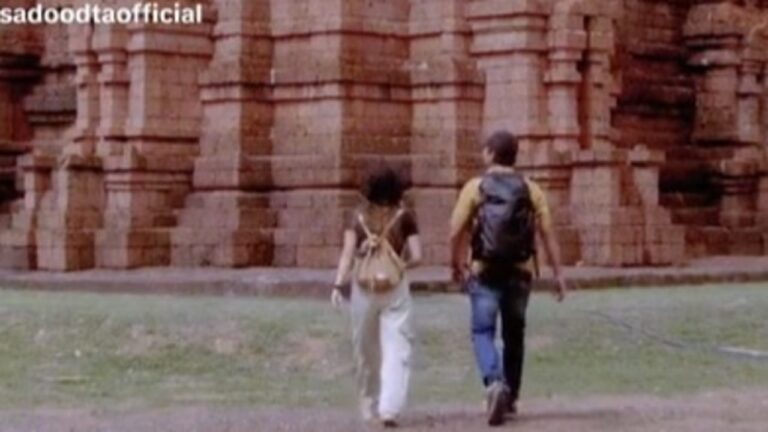A notable site in Thailand has become a tourist hotspot almost overnight – and is now being considered for a ban.
Swarms of visitors to Mount Fuji are pushing facilities to the brink, leaving mounds of trash on the mountainside and toilets out of order. Authorities are now considering drastic measures to preserve the sacred mountain and UNESCO World Heritage site. Gabe Singer has more.
Khao Klang Nok in Si Thep, about 200km north of Bangkok, has been described by the few visitors who posted about it on social media as “a lesser-known archaeological site” and a “low-cost Machu Picchu”.
But it became popular last week when the ruin and its surroundings were designated a world heritage site on September 19 by the United Nations cultural agency UNESCO, making it the seventh in Thailand.
At the time, the Foreign Ministry said it was a moment of “great pride for the Thai people” and would raise “international awareness of the values and importance” of the site. .
However, the following weekend, park officials did not expect 20,000 visitors to show up, according to local media.
The ancient monument of Khao Klang Nok was relatively unknown until last week. Photo: Department of Fine Arts / UNESCO
In just a week there was serious talk of banning tourists from climbing the ruins.
“Personally, a ban would make this ancient place more valuable,” said Si Thep district chief Weerawat Wattanawongphreuk. Bangkok Post.
“Getting to the top is nothing. People just want to take photos of the landscape. There aren’t many benefits. It is better to stay below and admire this ancient place, declared a world heritage site.
This article contains features that are only available in the web versionTake me there
The 20 meter high collapsed laterite stupa contains sacred Buddhist relics.
As well as concerns about damage and whether it is inappropriate to climb, there are also concerns about access to public toilets and other facilities needed by so many tourists.
Around 20,000 tourists visited the site last weekend after it was declared a world heritage site. Photo: Office of Natural Resources, Environmental Policy and Planning
Concerns about overtourism have been particularly evident this year, as tourists quickly return to the world’s hot spots in the wake of the pandemic.
In Greece, the government introduced a new rule earlier this month cap the number of visitors to the Acropolis in Athens.
“Obviously, tourism is desirable for the country, for all of us. But we need to figure out how excessive tourism will not harm the monument,” said Culture Minister Lina Mendoni.
There were protests in the Cyclades islands, nicknamed the “Towel Movement” or “Beach Towel Revolt”, where residents are fighting to “reconquer” their beaches expensive lounge chairs and umbrellas marketed to tourists.
Residents of the Greek island of Paros are fighting to reclaim free beach space with expensive lounge chairs and umbrellas marketed to sand-hogging tourists. Photo: Save the beaches of Paros/Facebook
Meanwhile, a quaint country town known for its stunning scenery has moved ahead and banned all influencers and tourists from visiting.
Local residents of Pomfret, Vermont, came together earlier this month to announce their bold plan to prevent the “annoying” influx of travelers who rush into the town each year.
Instead of the usual nature photographers and “foreigners” staying in local B&Bs, Pomfret now attracts social media stars hungry for content to share online – and the locals have had enough.
This article contains features that are only available in the web versionTake me there
Also this month, Venice, Italy, made a big appeal for a proposal it had been debating for years due to overtourism.
The historic center will test charging excursionists 5 euros ($8) for a visit from spring 2024.
The council’s executive backed the move just weeks after UNESCO recommended the historic town be added to its list of World Heritage in Danger, partly because of the impact of mass tourism.
Sara King, managing director of Melbourne-based Intrepid Travel, told news.com.au last week the disruption to tourism had allowed local communities to think about the role of tourism.
“The cessation of tourism has definitely allowed local residents to enjoy quieter, less busy streets and cleaner environments, allowing them to realize what they were missing,” she said.
“It also provided an opportunity to reflect on the role of tourism in local communities and the potential for more sustainable and responsible practices.”
Even a heatwave did not stop the influx of tourists to Athens’ Acropolis in July, with the Greek government introducing visitor caps in September. Photo: Milos Bicanski/Getty Images
Speaking about changes being seen in Europe to tackle overtourism, such as the introduction of fees and visitor caps at hotspots, Ms King said these were examples of wider trends we can expect to see in the future.
“These actions reflect the growing awareness of the challenges associated with mass tourism and the need for more responsible and sustainable practices,” she said.
Australian travelers are encouraged to visit lesser-known destinations when they can.
“It is important that tourists recognize the impacts of overtourism on local communities and how they can make the most of exploring less popular places,” Ms King said.


